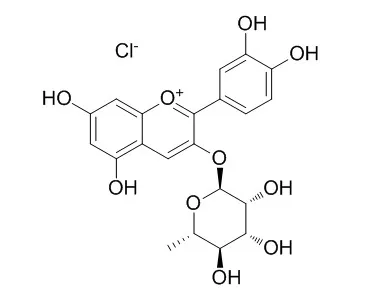| Kinase Assay: |
| Journal of Agricultural & Food Chemistry, 2014, 62(3):789-797. | | Effects of Anthocyanidins and Anthocyanins on the Expression and Catalytic Activities of CYP2A6, CYP2B6, CYP2C9, and CYP3A4 in Primary Human Hepatocytes and Human Liver Microsomes.[Reference: WebLink] | Anthocyanidins and anthocyanins are pharmacologically active constituents of various berry fruits, such as blueberry and cranberry. These compounds are also contained in massively used nutritional supplements based on extracts or dry matter from berry fruits.
METHODS AND RESULTS:
In the current study, we evaluated the effects of anthocyanidins and anthocyanins of the expression and catalytic activity of major drug-metabolizing enzymes CYP2C9, CYP2A6, CYP2B6 and CYP3A4 in primary cultures of human hepatocytes and human liver microsomes. Expression of mRNA was quantified by qRT-PCR. Expression of proteins was evaluated by western bloting and immunochemiluminiscence. Catalytic activity of CYP enzymes was measured by HPLC using specific enzyme substrates. Tested anthocyanidins (6) and anthocyanins (21) did not induce the expression of mRNA and protein of CYP2C9, CYP2A6, CYP2B6 and CYP3A4 genes in human hepatocytes. Catalytic activities of CYP2C9, CYP2A6, CYP2B6 and CYP3A4 enzymes were inhibited by all anthocyanidins in different extent (e.g. delphinidin inhibits CYP3A4 by >90% at 100 μM with IC50 32μM). Out of 21 anthocyanins tested, only cyanidin-3-O-rhamnoside (Cyanidin-3-O-rhamnoside chloride, CYP3A4 by >75% at 100 μM with IC50 44μM) and two glycosides of delphinidin significantly inhibited examined cytochromes P450.
CONCLUSIONS:
It may be concluded, that in the ranges of common ingestion of either food or a dietary supplement an induction or significant inhibition of CYP2C9, CYP2A6, CYP2B6 and CYP3A4 activity is most probably not expected. |
|






 Cell. 2018 Jan 11;172(1-2):249-261.e12. doi: 10.1016/j.cell.2017.12.019.IF=36.216(2019)
Cell. 2018 Jan 11;172(1-2):249-261.e12. doi: 10.1016/j.cell.2017.12.019.IF=36.216(2019) Cell Metab. 2020 Mar 3;31(3):534-548.e5. doi: 10.1016/j.cmet.2020.01.002.IF=22.415(2019)
Cell Metab. 2020 Mar 3;31(3):534-548.e5. doi: 10.1016/j.cmet.2020.01.002.IF=22.415(2019) Mol Cell. 2017 Nov 16;68(4):673-685.e6. doi: 10.1016/j.molcel.2017.10.022.IF=14.548(2019)
Mol Cell. 2017 Nov 16;68(4):673-685.e6. doi: 10.1016/j.molcel.2017.10.022.IF=14.548(2019)